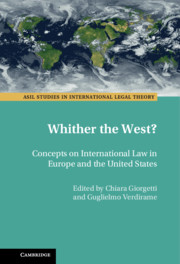Book contents
- Whither the West?
- ASIL Studies in International Legal Theory
- Whither the West?
- Copyright page
- Contents
- About the Authors
- Acknowledgements
- Introduction
- I The Idea of International Law in the Divided West
- II Specific Areas in International Law: Whither the West?
- 1 International Law and Constitutional Law: Is There a Final Arbiter?
- 2 International Adjudication and the Development of International Law
- 7 International Courts and Tribunals in the USA and in Europe
- 8 Unravelling a Paradox of Shared Responsibility
- 3 International Law and the Use of Force
7 - International Courts and Tribunals in the USA and in Europe
The Increasingly Divided West
from 2 - International Adjudication and the Development of International Law
Published online by Cambridge University Press: 29 April 2021
- Whither the West?
- ASIL Studies in International Legal Theory
- Whither the West?
- Copyright page
- Contents
- About the Authors
- Acknowledgements
- Introduction
- I The Idea of International Law in the Divided West
- II Specific Areas in International Law: Whither the West?
- 1 International Law and Constitutional Law: Is There a Final Arbiter?
- 2 International Adjudication and the Development of International Law
- 7 International Courts and Tribunals in the USA and in Europe
- 8 Unravelling a Paradox of Shared Responsibility
- 3 International Law and the Use of Force
Summary
European countries are seen as strong supporters of international adjudicatory institutions related to human rights and international criminal law, while the USA has generally been more skeptical about international courts and tribunals. While positions of the USA and Europe have generally been similar in relation to tribunals examining issues to trade and investment, for example. More recently and especially since the election of President Trump, the USA’s position towards all international courts and tribunals, including on matters of international economic law. The election of President Trump has resulted in a profound antagonism towards international courts and tribunals, and multilateral institutions more generally, in both words and facts. Differently, European countries, guided in large part by the European Union, have broadly maintained their support for international courts and tribunals, including trade related courts, and have voiced their desire for substantial changes in investor-state dispute resolution mechanisms. In both cases, European countries have not tried to dissociate from those courts, but rather, have argued for stronger, clearer and more permanent dispute resolution mechanisms.
Keywords
- Type
- Chapter
- Information
- Whither the West?International Law in Europe and the United States, pp. 175 - 201Publisher: Cambridge University PressPrint publication year: 2021

